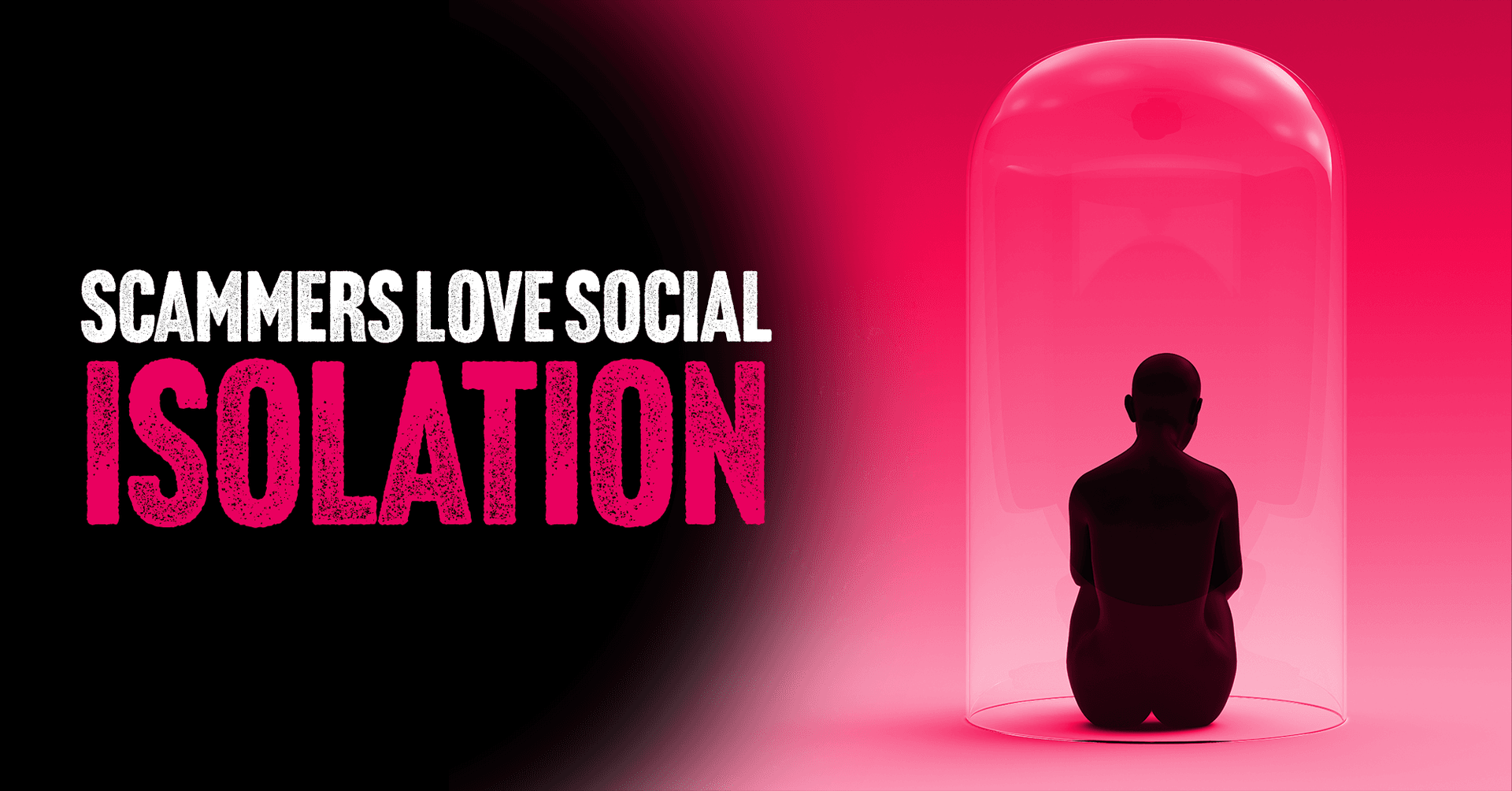- News
- Privacy
- Blog
The challenge of social isolation
Social isolation has become an increasingly concerning problem over the past few years, exacerbated by the global pandemic. It has meant that many thousands of people are being targeted by unscrupulous scammers looking to exploit the vulnerable. People who are isolated can become more and more separated from society and can be especially caught out when everything is online. With no one to ask or to give advice, isolated people can be tricked by scammers more easily.By guest blogger Louise Baxter
3 min read

Vulnerability is fluid and complex. Social isolation is one of the factors that can lead people into it and fall victim to a scam. People’s circumstances or the marketplace that put them in that position make them vulnerable. That isn’t to say people are vulnerable all the time, they move in and out of vulnerable situations and circumstances.
Social isolation can make people more situationally exposed and therefore potentially susceptible to fraud and scams. Since the pandemic we’ve expected most people to go from ‘bricks to click’, understanding complex information and navigate the internet, with no education or training all whilst potentially being socially isolated. This can be particularly tough for older people, unfamiliar with online payments and services.
Anyone can be a victim of a scam. Rightly research, conducted among over two thousand adults across the UK, found that almost half of Brits (48%) have fallen victim to one, or come close, with over a third (37%) losing money as a result. Raising awareness of common scams and groups of people who are often targeted is an important step towards encouraging behaviour changes that tackle the issue.
Older people are often targeted by scammers. Research has found that those over 70 suffer the greatest impact and suffer the most from a number of different types of scams, especially phone and mail scams. Figures from the National Trading Standards Scam Team show that they’re deliberately targeted more so than other demographics. This group also sees the largest proportion of people who are recurring victims of scams.
Those who are socially isolated can be the hardest to reach and often aren’t able to access the same support, advice and help that other people can. People that are scammed and are socially isolated are less likely to report scams, but they often suffer greatly, not just in the amount of money lost, but the overall impact on health and wellbeing.
Sadly, these people are not always treated as victims of crime. Scams and fraud victims are targeted by organised crime groups and are defrauded out of what is often their life savings. They are also left with the mental scars of being a victim of this crime. They are often not treated the same as someone who is mugged in the street or as someone who has been burgled. This needs to change; we need to take away the shame and stigma of being scammed to increase reporting and awareness.
Retired people don't have the same opportunity to make up for their losses as younger people, and they often don’t have the same support networks and access to them. So, the focus related to scams and fraud should always be on the harm this crime has caused an individual, not on age or money lost.
We need to build community resilience and increase our knowledge and prevent this from happening to our mums, dads, and neighbours.
Looking out for each other.
Prevention is far better than cure so we need to work together to educate people on how to avoid becoming a victim.
Let’s look out for our neighbours and our local people and check for the tell-tale signs of financial abuse and fraud. Are people receiving loads of letters each week? Are they struggling to pay for other things? Does the phone ring constantly? Let’s take away the stigma and talk about it.
You can get on the scam wagon and help us highlight this problem! Get involved. Please join us in our Stand Against Scams and become a Friend Against Scams at www.friendsagainstscams.org.uk
Remember, if you’ve received a text you think is a scam then you can forward to 7726 or take a screenshot and send it to report@phishing.gov.uk. If you’re receiving lots of unwanted phone calls or text messages you can also consider removing your details from data brokers, ensuring that you use a right to object to processing of your data.
Rightly Protect can help you get control of your digital footprint by getting your personal data deleted from companies that don’t need it, in one click and for free.
Louise Baxter @loubax29 is from the National Trading Standards Scams Team
Related Articles
- Privacy
9 min read

Scams: The summer pandemic
Millions of people have had their data stolen or compromised, leading to a huge variety of scams. Some scams come by email, some by text, others through calling you and impersonating a company or organisation such as HMRC or DVLA. The scams landscape is constantly unfolding to reveal more underhand and sophisticated ways to con you. In this blog, we reveal ten of the most common and what you can do to stay safe.
- Key issues
2 min read

ARE YOU BEING TARGETED?
It’s shocking how much data companies have on you, including companies you’ve never heard of. You need to protect yourself. Rightly can help.